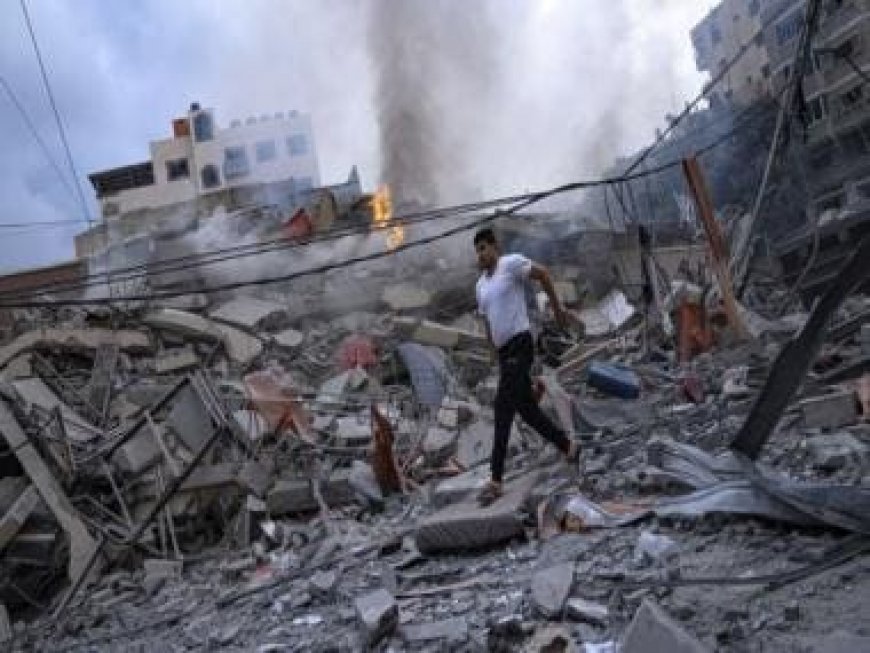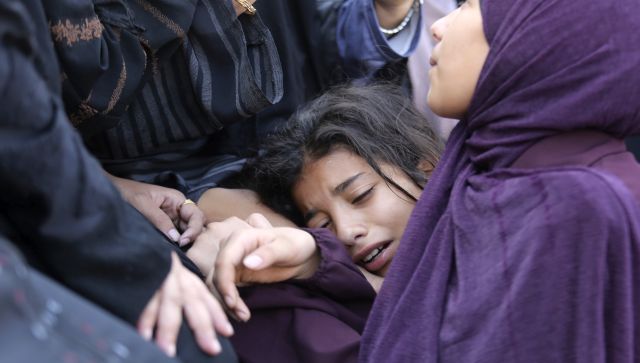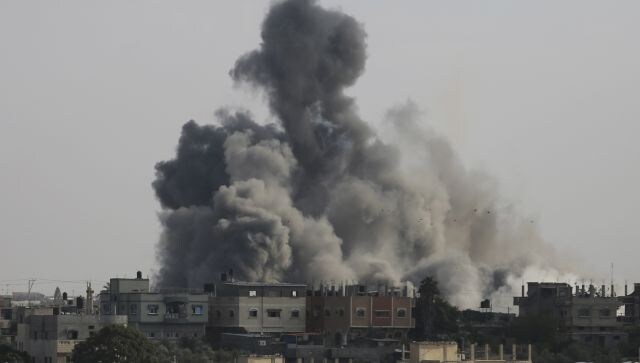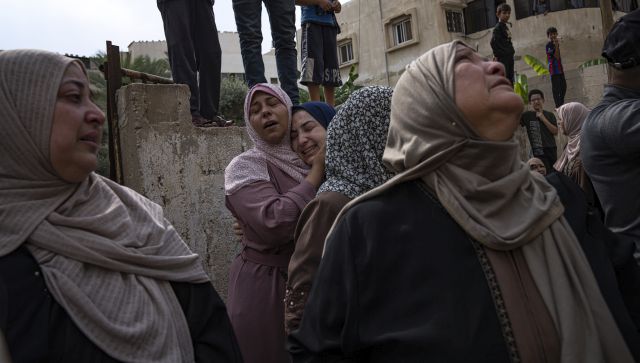Gaza has one exit route and Israel is bombing it. Where do its people go?
Gaza has one exit route and Israel is bombing it. Where do its people go?

They call it the world’s largest open-air prison. And right now there is no escaping it. After Hamas’s stealth attack on Israel, its military continues to pound Gaza, home to more than two million people. In five days, 900 people have died and around 2,60,000 persons have been rendered homeless.
Residential buildings, schools, hospitals and mosques have been reduced to rubble. Two days ago, the Israeli military asked Palestinians to flee Gaza and head to Egypt.
“I am aware that the Rafah crossing (on the Gaza-Egypt border) is still open. Anyone who can get out, I would advise them to get out,” said Lieutenant-Colonel Richard Hecht, chief military spokesperson of the Israel Defense Forces (IDF) to the foreign media. Later, he amended the statement to inform that the Rafah crossing was closed.
So where do Gazans go as Israel continues to hammer the enclave with airstrikes? What exit options do they have? The answer is none. We explain why.
What is Gaza?
Gaza is a narrow strip of land, sandwiched between Israel, Egypt and the Meditterian Sea. The largest city in Palestine, it is spread over an area of 365 sq km – it is one/fourth the size of Delhi, according to a report on NDTV.
The people living in the Gaza Strip are Palestinians. The population of two million comprises both indigenous settlers and numerous refugees who fled to the enclave from Israel during the creation of the nation in 1948 and after the military battles between Israelis and Palestinians that followed. It is one of the most densely populated places in the world.
Don’t miss: Our coverage from Tel Aviv on the Israel-Hamas war
Who controls Gaza?
Gaza was once ruled by Egypt but the Israeli military took over after the Six-Day War in 1967 between Israel and the Arab States. It was under the control of Tel Aviv for the next 38 years. However, this period was marred with protests by Palestinians against Israeli occupation.
In 2005, Israel decided to withdraw from Gaza, formally ending its military occupation of the territory, along with 7,000 settlers.
In the year that followed, elections were held and Hamas emerged victorious. They formed a coalition government with Fatah, which was founded by the former president of the Palestinian Authority Yasser Arafat and now governs 40 per cent of the occupied West Bank.
However, in 2007, the government collapsed as Hamas took full control of the Gaza Strip. The militant organisation opposes the peace process with Israel and, in its charter, demands the country’s destruction. Gaza has held no elections since.
This map shows Israel and the Gaza Strip, where a deadly conflict escalated Sunday pic.twitter.com/W1ax7LBpvE
— AFP News Agency (@AFP) May 5, 2019
Since Hamas took control, the strip has been blockaded by Israel and Egypt. Tel Aviv controls its airspace and shoreline, as well as what goods can cross Gaza's borders, reports NPR. Egypt too closed its border crossing with Gaza in 2007.
Hamas and Israel were embroiled in a three-week war in 2008, which claimed close to 1,200 lives. Since then, the two sides have fought several conflicts. The attack on Saturday, however, was unprecedented and the deadliest against Israel in 50 years.

What’s happening in Gaza now?
After the Hamas assault, Israel declared a “state of war” and has been targeting Gaza. At least 950 people have died and the death toll is expected to rise. Another 5000 have been injured, the Hamas-run health ministry said.
The attacks targeted civilians’ homes and roads and resulted in “direct injuries among citizens,” the Palestinian Ministry of Interior Affairs said in a statement. Dozens of residential buildings, factories, mosques and shops were hit in overnight strikes, the head of the government’s media office, Salama Marouf, told AFP. One blast hit Gaza City’s seaport, setting fishing boats aflame.
Israel has ordered a “complete siege” of Gaza, cutting off electricity, fuel and water to the enclave. According to a report in the BBC, Gaza residents said that they have not received aid since Saturday. Around 80 per cent of the locals depend on humanitarian aid because of the ongoing hostilities with Israel.

The World Health Organization said that supplies it had pre-positioned for seven hospitals in Gaza have already run out amid the flood of wounded. The head of the medical aid group Doctors Without Borders said surgical equipment, antibiotics, fuel and other supplies were running out at two hospitals it runs in Gaza, reports AP.
Rescue officials in Gaza said “large numbers” of people were still trapped under the remnants of levelled buildings, with rescue equipment and ambulances unable to reach the area.
“There is no safe place in Gaza right now. You see decent people being killed every day,” Gaza journalist Hasan Jabar told AP after three Palestinian journalists were killed in the Rimal bombardment. “I am genuinely afraid for my life.”
There is death and destruction everywhere. And with no food, water, and electricity a bigger humanitarian crisis looms large.
Do Gazans have an escape?
Israel has issued a warning to Gazans to flee. Prime Minister Benjamin Netanyahu posted on X on Saturday, “I say to the residents of Gaza: Leave now because we will operate forcefully everywhere.”
But there is little escape as the airstrikes continue. Israel is warning civilians to evacuate neighbourhood after neighbourhood and then inflicting devastation.

For residents of Gaza, Rafah is the only crossing point into Egypt’s Sinai Pennuisala. The rest of the densely populated enclave is surrounded by sea and by Israel. However, on Tuesday Israeli bombardments hit the area of the Rafah border crossing between the strip and Egypt, according to a report in Reuters.
The strike followed a similar incident on Monday that partially disrupted operations at the border.
The only exit option for Palestinians is not a safe one.
Israel-Palestine conflict explained:
In graphics | A brief history of the Israel-Palestine conflict
Mohammed Deif: Hamas’ wheelchair-bound military chief who planned Israel attack
Is Israel preparing a ground invasion of Gaza?
Did Iran help Hamas plan the deadly attack on Israel?
Mossad, Aman, Shin Bet: How Israel’s intelligence agencies failed to prevent Hamas attack
Hamas, Hezbollah & Intifada: A guide to understanding the glossary of Israel-Palestine conflict
Israel-Palestine conflict: Where does India stand? Which countries back Hamas?
Rockets, gliders and more: How Hamas compares to Israel in weapons stockpile
What is the Gaza Strip, which is at the centre of Israel-Palestine conflict?
How many Indians are stranded in Israel and how safe are they?
What is Egypt saying?
Israel's assault on Gaza has alarmed Egypt, which has urged Israel to provide safe passage for civilians from the enclave rather than encouraging them to flee southwest towards Sinai, two Egyptian security sources were quoted by Reuters as saying. Egypt is moving to prevent a mass exodus from Gaza into its Sinai Peninsula, Gaza officials and Egypt security sources told the news agency.
Egyptian president Abdel Fattah al-Sisi said on Tuesday that the escalation in Gaza was "highly dangerous" and that Egypt was pursuing a negotiated solution to the violence with regional and international partners.
Egypt would not allow the issue to be settled at the expense of others, Sisi said in comments reported by state news agency MENA, an apparent reference to the risk that Palestinians could be pushed into Sinai.
Egypt’s military had taken up new positions close to the border and was running patrols to monitor the area, said Ahmed Salem of the Sinai Foundation for Human Rights.

What is Israel saying?
Israel’s defence minister Yoav Gallant said that Gaza will “never go back to what it was”, adding that he has “released all restraints” on the IDF in their fight against Hamas.
“Hamas wanted a change in Gaza, it will change 180 degrees from what he thought. They will regret this moment. Gaza will never return to what it was,” he warned.
Israel has vowed revenge, the Hamas has threatened to kill hostages taken from Israel. There are no signs of a ceasefire and caught in the crosshairs are the ordinary men, women, and children.
With inputs from agencies
What's Your Reaction?



























































